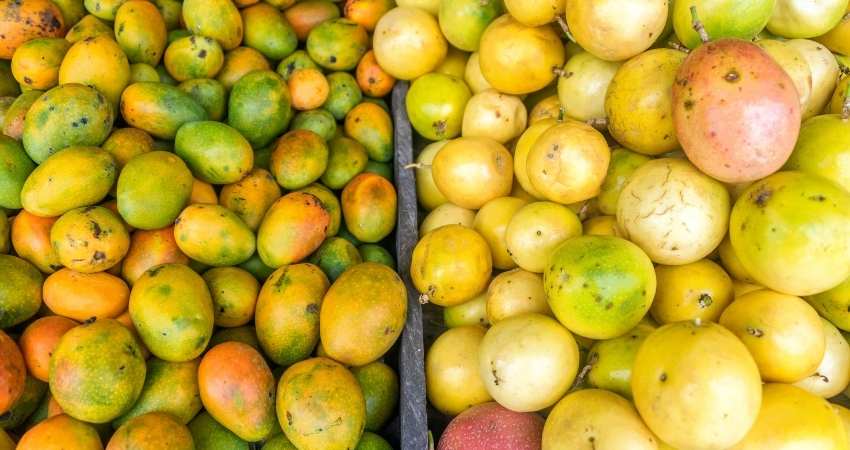Organic Mango vs. Conventional Mango: Which is Better?
During my health coaching sessions many people ask me about mangos including which is better, organic mango vs conventional?
Organic mangos are better because they are grown without fertilizers, pesticides, or fungicides. However, conventional mangos remain an excellent alternative because they have thick, fleshy skin and a hefty percentage of them have no pesticide residues.
This article will give detailed information on the differences between organic and conventional mangos. It will also look into the following:
- The benefits of choosing organic mangos.
- Why you might want to choose conventional mangos.
- Which option is better for you.
- The downsides of both types of mangos.

Pros and Cons of Organic Mangos
Mangos are popular tropical fruits that help contribute to good health1. In general, most of the farming practices in organic mango farming are also used in conventional mango farming.
The main differences are in nutrient conservation, weed, pest and disease control, and postharvest management.
The underlying principle here is that healthy soils are necessary for healthy plants. As such, organic mango production relies on well-balanced soil that is enhanced using adequate organic matter and humus for plant nourishment.
The resulting land is also resilient against degradation in the form of erosion or nutrient leaching.
Let’s now explore the advantages and disadvantages of organic mangos.
Pros of Organic Mangos
- There is no use of synthetic fertilizers, herbicides, pesticides, or fungicides. Organic mangos are thus free of toxic chemicals that can harm your body if ingested2. Some health concerns related to pesticide exposure include various cancers, diabetes, Alzheimer’s, and chronic diseases like cardiovascular disease and rheumatoid arthritis. Furthermore, eating organic mangos lowers your exposure to pesticides.
- Organic mangos are a delicious, nutritious, healthy snack for all ages. They contain vitamins A, C, E, and B6 as well as iron and potassium. They are also chock full of fiber and antioxidants that promote good health3.
- They go well with other fruits and food items. Mangos are excellent for use in fruit salads, smoothies, and salsas. Besides, unripe mangos are also quite popular in Asian cultures for chutneys, relishes, and pickles. You may serve them alongside rice, grilled fish, or with a green salad.
- Buying organic mangos helps organic farmers reduce their carbon footprint. This is because the farmers rely on crop rotation and natural fertilizers instead of synthetic chemicals. This also safeguards the environment for future generations.
Cons of Organic Mangos
- They are expensive. You spend a lot more money when buying organic mangos than you would on conventional mangos. They are also not always accessible, which may contribute to their high price too.
- They bruise easily. While mangos look sturdy, they bruise very easily, so avoid stacking them together to prevent this.

Pros and Cons of Conventional Mangos
Mango fruits are typically less reliant on chemical fertilizers, unlike other fruit crops4. As a result, recycling plant residues, organic manures, and biofertilizers sufficiently address their nutritional needs.
While conventional mangos may contain pesticide residues, the levels may not be alarming. Indeed, the Environmental Protection Agency (EPA), the body that regulates pesticide residue safety levels, reckons that these levels are tiny.
Moreover, the amounts get further reduced during harvesting, in transit, and upon washing the mangos.
Here are the pros and cons of conventional mangos:
Pros of Conventional Mangos
- Conventional mangos have a low pesticide load ((EWG: Full List: EWG’s 2020 Shopper’s Guide to Pesticides in Produce)). Due to this fact, mangos clinched an enviable spot on the “Clean Fifteen” list. Besides, 78 % of the mango samples tested by EWG contained no signs of pesticide residues.
- They provide many health benefits. Like their organic counterparts, these mangos are full of nutrients and may help lower the risk of macular degeneration as well as colon cancer. Mangos also contain enzymes that aid in digestion.
- Buying from local farmers promotes their business. It also means that you access fresher fruits since they don’t undergo long transit to the market.
Cons of Conventional Mangos
- They may contain pesticide residues even though on a lower scale. Therefore, always remember to wash and peel your mangos before eating them.
- They have a high carbon footprint. This is because commercial mangos in America are often imported, and they go through shipping and transportation, which increases their carbon load.
Which One? Organic Mango or Conventional
When deciding between organic and conventional fruits, a number of factors come into play. One is that mangos have a fleshy peel. Since this is where most of the pesticides are, if you don’t eat the peel, then you are safe buying conventional mangos. This is more so if the mangos are locally-grown.
Secondly, the Environmental Working Group (EWG) provides shoppers with a guide to pesticide levels in fruits and vegetables. The “Dirty Dozen” and “Clean Fifteen” lists thus help you make an informed choice when shopping for your produce.
For instance, the 2018 Clean Fifteen list includes mangos among fruits and vegetables with the lowest pesticide contamination levels5. This was as a result of tests carried out by the USDA.
These lists do not mean that you should not eat conventional produce such as mangos at all. On the contrary, eating fresh fruits and vegetables – whether organic or conventional- is highly advisable since they are an essential part of a healthy balanced diet.
Moreover, pesticide contamination varies per specific food. So, it is crucial to know which food items are contaminated and to what level. Besides, mangos can withstand substantial pesticide contamination due to their protective peel.
Personally, the risk of chemicals with mangos is minimum, but I would avoid it and choose organic.

How Do You Know if You Are Buying Organic?
The United States Department of Agriculture, USDA, provides certification for organic produce. Organic mangos thus bear a stamp to show that they are organic. You will find them in your supermarket’s produce display, and if you are environmentally conscious, then organic mangos are what you need.
But did you know that because of their high demand, lots of mangos undergo artificial ripening6 – with chemicals – and then sold as natural and fresh? Calcium carbide, the toxic chemical used, causes many health disorders, including dizziness, mental confusion, and also affects the neurological system.
Fun fact: Test whether your mangos are ripened artificially by placing them in a bucket full of water. If they sink, they ripened naturally, and if not, they got harvested using artificial methods. Besides, artificially ripened mangos contain minimal juice, plus you might experience a tingling sensation while eating one.
If you have any questions about this article don’t hesitate to comment below or email us. You can find an email on our contact page.
Read Next – More Food vs. Food!
Organic Lentils vs. Conventional Lentils: Which is Better?
Organic Flaxseed vs. Non-Organic Flaxseed: Which is Better?
Organic Bananas vs. Regular Bananas: Which is Better?
- National Center for Biotechnology Information: Mangifera Indica (Mango) [↩]
- National Center for Biotechnology Information: Pesticides and human chronic diseases: evidences, mechanisms, and perspectives [↩]
- Mango.org: Get To Know Your Mango [↩]
- ResearchGate: Growing mango under organic system [↩]
- EWG: EWG’s 2018 Shopper’s Guide to Pesticides in Produce [↩]
- Agriculture & Food Security: A review on the legislative aspect of artificial fruit ripening [↩]
